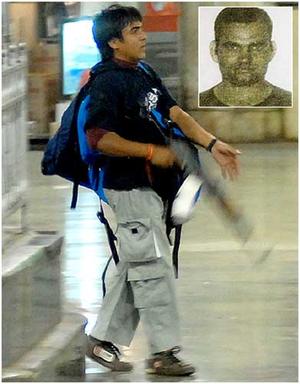Mumbai gunman sentenced to death in India
The sole surviving gunmen of the November 2008 Mumbai attack, in which 166 people were killed, was sentenced to death by an Indian court; the attack was noted not only because of its scope, but also because of the degree of complicity of the Pakistani army and intelligence services in its planning and execution, and the admission by the Pakistani government that the perpetrators were Pakistanis and that the plot was hatched on Pakistani soil

Kasab at the Mumbai Oberon Hotel in 2008 // Source: zolengthe.net
Ajmal Amir Kasab, 22, the sole surviving Pakistani gunman of the 2008 terrorist attack on Mumbai, was sentenced Thursday to die for his role in the bloody siege that killed 166 people. He was convicted Monday on all eighty charges against him. The judge, M. L. Tahiliyani, sentenced him to death by hanging for four offenses, including murder fifty-two people and waging war against India.
The role of Pakistan’s military in the attack
The Mumbai attack is notable for the number of dead and injured, but it is also notable for the degree of involvement of the Pakistani security establishment in it.
Within weeks after the November 2008 attack, police authorities in Mumbai accused a serving officer in the Pakistan Army of being involved in the terrorist attacks on the city. That move by the police represented the first time India accused an individual linked to the Pakistani state of playing a role in the Mumbai atrocities.
The Times’s Rhys Blakely wrote that the document detailing the charges against Ajmal Amir Kasab, the sole gunman to be captured alive, accused Colonel Saadat Ullah of helping to set up the phone network used by the terrorists to speak to their handlers during the attacks. The document claimed that the officer was part of the Pakistan Army’s Special Communications Organization (SCO), an offshoot of the signals corps. Col. Ullah was traced using information partly supplied by the FBI, a senior police officer said.
According to police documents obtained by the Times, the ten Islamist militants who rampaged through Mumbai spoke to their handlers in Pakistan during the attacks via mobile phones connected to Callphonex, an Internet telephony provider based in New Jersey. The militants’ Callphonex account was set up by an individual who identified himself as Kharak Singh, using the e-mail account kharak_telco@ yahoo.com. Indian police claim that this e-mail account was accessed from ten different unique IP addresses, including one used by Col. Ullah.
Blakely reports that in the 11,000-page charge sheet filed by the Indian police against Kasab, the colonel’s physical address is given as Qasim Road, Rawalpindi, Pakistan, which is the headquarters of the SCO. The document said that Col. Ullah and another man, Khurram Shazad, of the same address, “facilitated communication … and hence conspired with [Kasab] in perpetuating the heinous crime.”
The charge sheet also detailed the involvement of a mastermind figure referred to by the gunmen and their handlers during their
